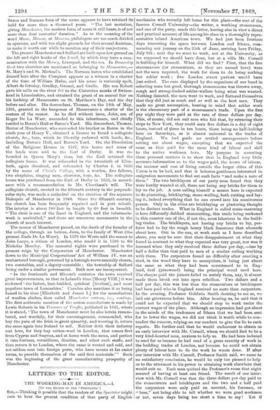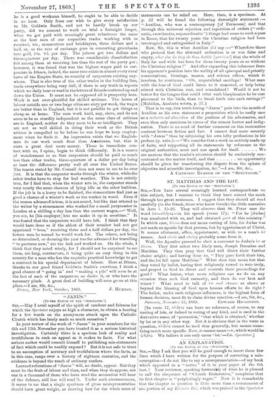LETTERS TO THE EDITOR.
THE WORKING-MAN IN AMERICA.—I.
[TO THE EDITOR OF THE SPECTATOR.")
Stn,—Thinking it possible that the readers of the Spectator might care to hear the present condition of that party of English mechanics who recently left home for this place—the seat of the famous Cornell University—the writer, a working stonemason, and one of the party, sends this letter, having also in view a direct and practical account of life among his class in a thoroughly repre- sentative inland American town. We had just been fourteen days traversing the space between London and Ithaca, com- mencing our journey on the 25th of June, arriving here Friday, July 9th ; next day we went to work, not at the University, as we supposed we should have done, but at a villa Mr. Cornell is building for himself. What did we find ? First, that the five stonemasons (or stonecutters, as they are named here) were not the men required, the work for them to do being nothing but ashlar work ; five London street paviors would have just suited. The care displayed by the organizers of our band in selecting none but good, thorough stonemasons was thrown away, rough and strong-limbed ashlar-wallers being what was wanted. Nothing daunted, the men went to work, and flattered themselves that they did just as much and as well as the best men. They made no great assumption, bearing in mind that ashlar work is the elementary part of a stonemason's trade. Upon the first pay night they were paid at the rate of three dollars per day. This, of course, did not suit men who felt that, by retracing their steps to New York, they could earn five dollars in a day of eight hours, instead of three in ten hours, there being no half-holiday here on Saturdays, as is almost universal in the trades of England. We had rade no settled arrangements before setting out about wages, excepting that we expected the same as that paid for the same kind of labour and skill to the native workmen here. My purpose in narrating these personal matters is to show that in England very little accurate information as to the wages paid, the hours of labour, the manner and cost of living outside the larger cities of this Union is to be had, and that it behoves gentlemen interested in emigration movements to find out such facts "and make a note of them." The two bricklayers of our party soon found that they were hardly wanted at all, there not being any bricks for them to lay on the job. A man calling himself a mason here is expected to do plastering, bricklaying, stone-walling, both cutting and lay- ing it, indeed everything that he can crowd into his omnivorous person. Only in the cities are bricklaying or plastering thought to be distinct trades. What in England is called stone-masoning is here differently dubbed stonecutting, this trade being reckoned in this country one of the, if not the, most laborious in the build- ing trades. The bricklayers, not having any bricks to lay, per- force had to lay the rough heavy black limestone that abounds about here. Out in the sun, at work such as I have described above, you may be sure that their disappointment at what they found in contrast to what they expected was very great, nor was it lessened when they only received three dollars per day, —less by half a dollar than that paid to men of a similar calling working with them. The carpenters found no difficulty after erecting a shed, in the wood they have to manipulate, it being just about the same as what they had been accustomed to in Eng- land, deal (pinewood) being the principal wood used here. The cheque paid the joiners failed to satisfy them, nay, it almost made them break out into open rebellion. Two dollars and a half per day, this was less than the stonecutters or bricklayers had been paid who in England received no more than carpenters. In the evening, Professor Goldwin Smith desiring to see us, we laid our grievances before him. After hearing us, he said that it could not be expected that we should stop to work under the current wages of the place. Although an impression had got about in the minds of the tradesmen of Ithaca that we had been sent for to lower the wages, we did not think it worth while to con- tradict the rumour, relying on our conduct to give the lie to such reports. He further said that he would endeavour to obtain us an early interview with Mr. Cornell, whom we should find to be a very kind-hearted man, anxious to help us. He had been induced to send for us because he had read of a great scarcity of work in the building trades of London, not because he could not obtain plenty of labour here to do the work he wants done. If after our interview with Mr. Cornell, Professor Smith said, we came to no satisfactory conclusion, he would be only too pleased to help us to the uttermost in his power in obtaining work elsewhere that would suit us. Each man quitted the Professor's room that night assured of having at least one friend. The result of our inter- view with Mr. Cornell was that the three dollars per day paid to the stonecutters and bricklayers and the two and a half paid the carpenters were only paid on account, his foreman, or "boss," not being able to tell whether we were good workmen or not, seven days being too short a time to say ! Yet if he is a good workman himself, he ought to be able to decide in an hour. Only from our wish to give every satisfaction to Mr. Goldwin Smith, and not to hastily break up our party, did we consent to work on trial a fortnight longer, when we got paid with seemingly great reluctance the same as the best men of our respective trades working with us received, viz., stonecutters and bricklayers, three dollars and a half, or, as the rate of exchange goes in converting greenbacks into gold, 10s. 9d. per day. The joiners got two dollars and three-quarters per day. There was considerable dissatisfaction felt among them at receiving less than the rest of the party got ; however, it was found that was the highest wages paid to car- penters in Ithaca, indeed, the same rate exists in almost every rural town of the Empire State, no scarcity of carpenters existing any- where. That is also true of the other trades in the building line, trade everywhere being very dull, if there is any truth in reports which we daily hear or read in the letters of friends scattered up and down the Union. It must not be supposed all is prosperity here. Work is not over-plentiful for skilled artizans. The hours of labour outside one or two large cities are sixty per week, the wages are better than in England, but it is not pos.sible to get things so cheap as at home. The men work hard, nay, slave, and do not seem to be so sturdily independent as the same class of artizans are in England, neither do they seem to be so intelligent. They are not so well skilled in doing their work as the British artizan is compelled to be before he can hope to keep employ- ment when he finds it. An impression exists that we English- men do our work much finer than Americans, but, that it costs a great deal more money. Those in immediate con- tact with us, I opine, begin to think differently. It is a source of wonderment to us that carpenters should be paid so much less than other trades, three-quarters of a dollar per day being at least the difference pretty well all over the United States. The reason stated by Mr. Cornell does not seem to me to be over just. It is that the carpenter works through the winter, while the other trades have to stop for bad weather. This is not strictly true, for I find that, when the winter sets in, the carpenter stands very nearly the same chances of lying idle as the other builders. If the job is in a hurry to be finished, the stonecutters find just as good a chance of a winter's work as the worker in wood. Even if the reason advanced is true, it is not sound, but like that uttered to the writer by a stonemason who worked for a small jerrymaater in London at a shilling a day less than the current wages,—" Well, you see, he [his employer] lets me make it up in overtime." It was feared that the carpenters would have left. I think that they would have done so if the ablest of their number had not got appointed "boss," receiving three and a half dollars per day, the lowest sum he named he would work for. The others, not being so determined, or deeming the year too far advanced for travelling "to pastures new," ate the leek and worked on. On the whole, I think that they acted wisely, for I should not be surprised to see them, ere long, contractors, it being quite an easy thing in this country for a man who has the requisite practical knowledge to get a contract in his special department of labour. Here at Ithaca, thanks to our good friend Goldwin Smith's exertions, I think a good chance of " going in" and "making a pile" will soon be at the feet of such of the carpenters as desire it, or who have the necessary pluck. A great deal of building will soon go on at this place.—I am, Sir, &c.,
Ithaca, New York, October, 1869.
J. HCRTON.



































 Previous page
Previous page